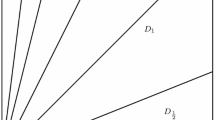Abstract
This paper revisits the aggregation theorem of Chichilnisky (1980), replacing the original smooth topology by the closed convergence topology and responding to several comments (N. Baigent (1984, 1985, 1987, 1989), N. Baigent and P. Huang (1990) and M. LeBreton and J. Uriarte (1990a, b). Theorems 1 and 2 establish the contractibility of three spaces of preferences: the space of strictly quasiconcave preferences P SCO, its subspace of smooth preferences P supSinfSCO , and a space P 1 of smooth (not necessarily convex) preferences with a unique interior critical point (a maximum). The results are proven using both the closed convergence topology and the smooth topology. Because of their contractibility, these spaces satisfy the necessary and sufficient conditions of Chichilnisky and Heal (1983) for aggregation rules satisfying my axioms, which are valid in all topologies. Theorem 4 constructs a family of aggregation rules satisfying my axioms for these three spaces. What these spaces have in common is a unique maximum (or peak). This rather special property makes them contractible, and thus amenable to aggregation. However, these aggregation rules cannot be extended to the whole space of preferences P which is not contractible and therefore does not admit continuous aggregation rules satisfying anonymity and unanimity, Chichilnisky (1980, 1982). The results presented here clarify an erroneous example in LeBreton and Uriarte (1990a, b) and respond to Baigent (1984, 1985, 1987) and Baigent and Huang (1990) on the relative advantages of continuous and discrete approaches to Social Choice.
Similar content being viewed by others
References
Baigent N (1984) A reformulation of Chichilnisky's impossibility theorem. Econ Lett 16: 23–25
Baigent N (1985) Anonymity and continuous social choice. J Math Econ 13: 1–4
Baigent N (1987) Preference proximity and anonymous social choice. Q J Econ 102: 162–169
Baigent N (1989) Some further remarks on preference proximity. Q J Econ 104: 191–193
Baigent N, Huang P (1990) Topological social choice: reply to LeBreton and Uriarte. Soc Choice Welfare 7: 141–146
Black D (1948) On the rational of group decision making. J Polit Econ 56: 23–34
Chichilnisky G (1979) On fixed point theorems and social choice paradoxes. Econ Lett 3: 347–351
Chichilnisky G (1980) Social choice and the topology of spaces of preferences. Adv Math 37: 165–176
Chichilnisky G (1982) Social aggregation rules and continuity. Q J Econ 96: 337–352
Chichilnisky G (1983) Social choice and game theory: recent results with a topological approach. Pattanaik PK, Salles M (eds) Social Choice and Welfare, chap 6. North-Holland, Amsterdam, pp 79–102
Chichilnisky G (1990a) On the mathematical foundation of political economy. Political Economy Lecture, Harvard University, March 22, 1990. Contr Polit Econ 9: 25–31
Chichilnisky G (1990b) General equilibrium and social choice with increasing returns. Ann Oper Res 23: 289–297
Chichilnisky G, Heal GM (1983) Necessary and sufficient conditions for a resolution of the social choice paradox. J Econ Theory 31: 68–87
Chichilnisky G, Heal GM (1984) Patterns of power. J Publ Econ, pp 333—349
Debreu G (1972) Smooth preferences. Econometrica 40: 603–615
LeBreton M, Uriarte JR (1990a) On the robustness of the impossibility result in the topological approach to social choice. Soc Choice Welfare 7: 131–140
LeBreton M, Uriarte JR (1990b) Topological social choice: a rejoinder. Soc Choice Welfare 7: 147–148
Spanier E (1966) Algebraic topology. McGraw-Hill, New York
Author information
Authors and Affiliations
Additional information
Comments from Geoffrey M. Heal, Andreu Mas Colell, Jean Francois Mertens and Maurice Salles are gratefully acknowledged. Research support was provided by NSF SES 8409857.
Rights and permissions
About this article
Cite this article
Chichilnisky, G. Social choice and the closed convergence topology. Soc Choice Welfare 8, 307–317 (1991). https://doi.org/10.1007/BF00183042
Received:
Accepted:
Issue Date:
DOI: https://doi.org/10.1007/BF00183042




